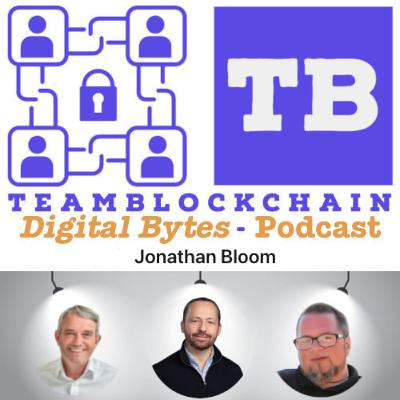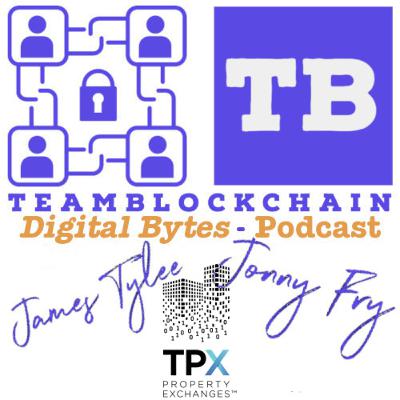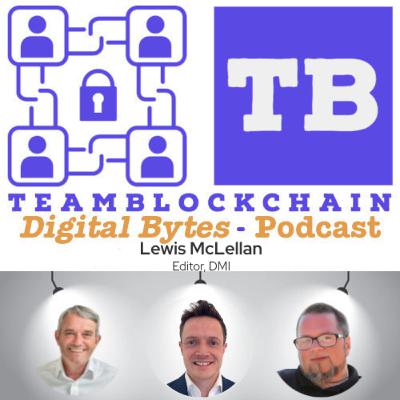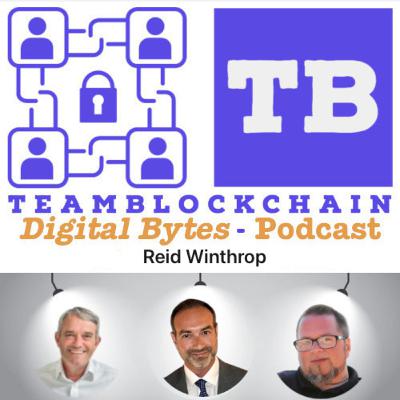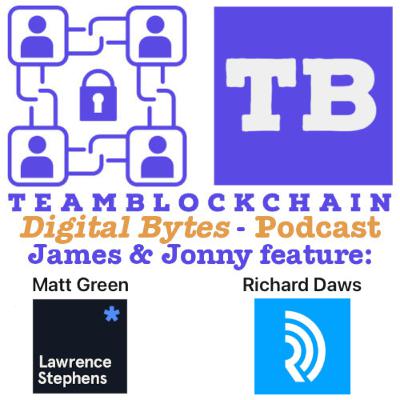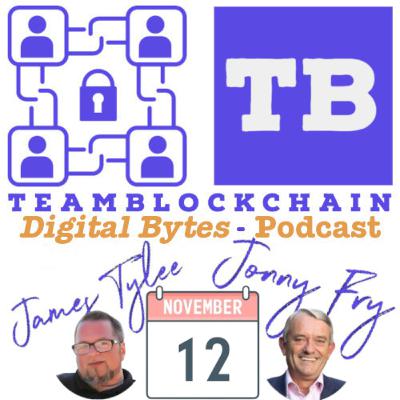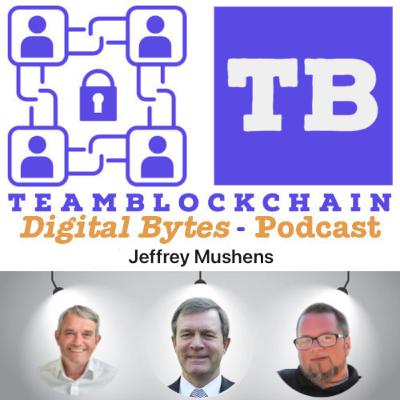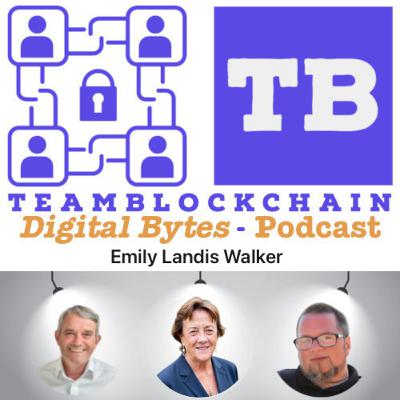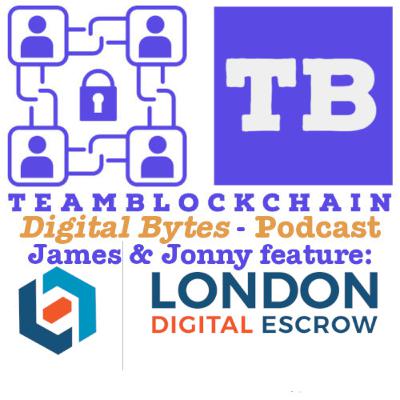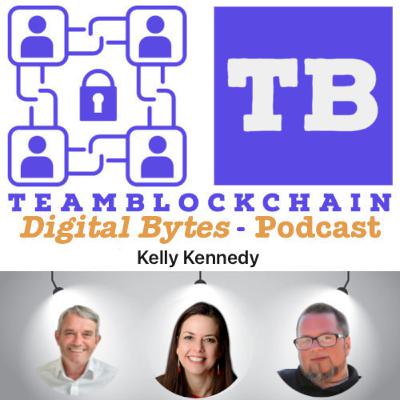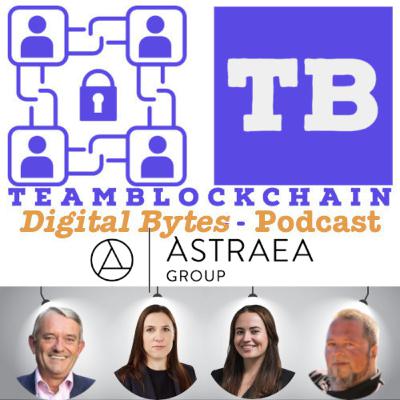Discover Digital Bytes by Team Blockchain Radio; Powered By Cyber.FM
Digital Bytes by Team Blockchain Radio; Powered By Cyber.FM

Digital Bytes by Team Blockchain Radio; Powered By Cyber.FM
Author: James Tylee / Jonny Fry
Subscribed: 0Played: 2Subscribe
Share
© James Tylee / Jonny Fry
Description
Each week on the Digital Bytes Show, James Tylee, founder Cyber.FM in the USA, talks to Jonny Fry from TeamBlockchain reviewing the latest Digital Bytes. They explore how, where and why Blockchain technology and/or Digital Assets are being used in various industries and jurisdictions globally. Cyber.FM Radio, a product of Distributed Ledger Performance Rights Organization (DLPRO LLC), was established in 2008 and has 4.6 million listeners across 140 countries.
295 Episodes
Reverse
Dr Stephen Castell responds to the Law Commission's final report on digital assets, contending that the Commission has erred by proposing a new legal status for digital and crypto assets that is unnecessary and scientifically incorrect. He argues that the Commission's attempt to distinguish between different sets of algorithmic data as a new category of property is a technical fallacy and that existing Common Law can address any legal concerns. Castell warns that the proposed new property status could lead to miscarriages of justice akin to past instances such as PO Horizon, and highlights the Commission's limited understanding of technical nuances in law making.
Full Article Here
PayPal’s new stablecoin means it can offer payment services and products - PayPal’s USD (PYUSD) represents a significant shift beyond revenue generation, so positioning the company as a key player in the evolving digital economy. This move aims to go beyond conventional payment processing whereby facilitating transactions in emerging areas such as the metaverse and digital equities. PayPal’s new stablecoin means that it can now offer not simply payment services but tangible products that others such as Elon Musk's 'X' can now use and so further shape the digital economy's future.
Full Article Here
Asset tokenisation - DeFi's accessibility, transparency and security offers the promise to transform the financial sector and the way in which we trade assets. It could democratise financial services, especially in areas with few or unreliable financial institutions whilst making global transactions faster and more efficient. The worldwide tokenisation industry is predicted to grow to potentially $68trillion by 2030 as institutions complete their proof of works and scale their digitisation programs.
Full Article Here
Liquidity pools and the DeFi ecosystem - liquidity pools on decentralised exchanges are digital asset collections enabling automated trading on decentralised exchanges. Users trade directly using smart contracts and liquidity pools help make trading smoother, adjusting prices automatically based on the volume of buyers and sellers. Liquidity pools offer other advantages such as improving financial inclusion, can generate a passive income. The future of DeFi and liquidity pools is promising but security, scalability and regulation do need to be addressed.
Full Article Here
Has the Law Commission got it wrong regarding a ‘new, third type of property asset’? Dr Stephen Castell responds to the Law Commission's final report on digital assets, contending that the Commission has erred by proposing a new legal status for digital and crypto assets that is unnecessary and scientifically incorrect. He argues that the Commission's attempt to distinguish between different sets of algorithmic data as a new category of property is a technical fallacy and that existing Common Law can address any legal concerns. Castell warns that the proposed new property status could lead to miscarriages of justice akin to past instances such as PO Horizon, and highlights the Commission's limited understanding of technical nuances in law making.
Full Article Here
How AI and blockchain can transform the supply chain - AI and blockchains are crucial to guarantee effective supply chain management. The two technologies may improve the experience for suppliers and end customers by driving higher automation and providing scalability, expanding connection across supply networks and enhancing traceability in commodity movement. AI and blockchain technology are increasingly being seen as solutions to help alleviate some of the problems associated with supply chain management.
Full Article Here
How can a small business get onto the metaverse? - whilst it may sound like an open-world game on steroids, the metaverse has attracted attention from a number of the largest businesses across the globe, with some having poured millions into obtaining real estate in the metaverse. Adidas purchased a plot of land in The Sandbox with plans to fill it with branded content and merchandise, and PwC's Hong Kong branch, not wanting to miss out on the potential benefits, also purchased virtual land in The Sandbox in 2022. Furthermore, companies such as Meta and Microsoft have developed entire virtual workplaces (Microsoft's Mesh and Meta's Horizon), albeit relatively simple constructs.
Full Article Here
Why is digital cash ‘on its way’? - arguably, the 2008 banking crisis spawned a desire to have an alternative form of cash/payments as taxpayers questioned why they were being forced to bail out the bankers. Trust in bankers took another hit with the LIBOR revelation and bankers being fined $9billion in 2015. As society becomes ever more digitised, with the desire also to access services 24/7, it seem inevitable that cash is to be offered in a digital format. But this then raises concerns as to a potential loss of privacy…..
Full Article Here
Looking after your digital assets - interested in digital assets, but don't know where to start? Here we take a look at what digital wallets are, the difference between custodial and non-custodial wallets, and some tips on how to start.
Full Article Here
Wall Street’s new tokenization wave will stall without market readiness. A Swiss tokenized gold product failed because gold buyers rejected digital wrappers and crypto investors ignored gold. Infrastructure can fix custody and settlement, but adoption requires aligning blockchain’s 24/7 markets with legacy business hours, weekend pricing distortions, liquidity gaps, and always‑on compliance. Tokenization’s real value is in illiquid assets like private equity and real estate, where evolving regulation and infrastructure can finally support scale.Click here for the full article
Programmable privacy reshapes financial infrastructure by enabling institution-grade confidentiality on public or shared ledgers. Banks, asset managers and market venues can prove compliance (AML, KYC, solvency, reporting) without exposing trading strategies, customer data or collateral positions; this could accelerate tokenised markets, unlock institutional adoption and reduce operational risk. At the same time, regulators gain cryptographically guaranteed audit access, creating a new paradigm for privacy: neither secrecy nor transparency but verifiable, controllable disclosure embedded directly into financial instruments.To read the full article click here
When a seasoned lawyer loses his own business despite two decades of advising on major international transactions, something profound shifts. This episode features a former Legal Partner turned Entrepreneur who discovered that sophisticated founders face predictable blind spots—patterns that destroy innovative ventures regardless of legal counsel.The conversation begins with his book "Blind Spots" but quickly moves into fascinating territory: the paradox of digital property recognition. While the UK's Genius Act now legally classifies tokens as property, this creates as many problems as it solves. (Property brings obligations like seizure, yet lacks the financing mechanisms traditional assets enjoy.) Banks won't lend against digital collateral without consistent valuation standards and insurance products—the infrastructure simply doesn't exist yet.Drawing from 25 years of advisory experience, the guest outlines five structural vulnerabilities that compound dangerously during market crises: vision without protection, wrong metrics, crisis unpreparedness, partner evolution, and cash flow pressure. His forthcoming book launching February 11th offers practical frameworks like graduated trust and the 30% dependency threshold—tools to protect before problems emerge.How can founders innovate boldly while remaining protected from institutional forces beyond their control?Ready to discover the blind spots threatening your venture? This conversation combines hard-won wisdom with immediately applicable frameworks that could save your business.
In 1696, England attempted the world’s first tokenised property system, turning land into state-mandated legal-tender bills to rescue a collapsing monetary system. The National Land Bank failed, but its blueprint echoes today’s blockchain revolution. As the UK pushes toward a projected $4trillion tokenised real-estate market, the same questions return: can fractionalised property create liquidity without eroding trust? Three centuries on and the lesson endures - tokenisation transforms value, but sovereignty and confidence decide its fate.To read the full article click here00:00:00 - 330 Years of Tokenized Property History00:01:49 - Private Banks and Political Currency Control00:02:50 - War Debt Drives Monetary Innovation00:04:03 - England's First Legal Paper Money System00:05:54 - Newton's Mint Reforms and Historical Currency Parallels00:07:49 - Colonial Tokenized Property Money History00:09:12 - Asset-Based Money and Property Rights00:10:49 - Counterfeiting Charges and Informant Deals00:12:16 - Counterfeiting, Digital Money, and Shadow Economy00:14:32 - Australia's Counterfeiting Criminal History
Public blockchains are moving from experimental rails to components of regulated financial infrastructure, but adoption remains constrained by legacy policy frameworks. Institutional tokenisation is gaining traction (Franklin Templeton, Apollo and others now issue blockchain-native funds) as forecasts suggest up to $5tn of tokenised assets by 2030. Yet regulatory models still draw rigid lines between “public” and “permissioned” networks, a taxonomy increasingly irrelevant as hybrid architectures emerge. The next phase demands interoperability standards, legal settlement finality and risk-based regulation, not architecture-based restrictions.
Tokenisation has long been judged through the DeFi lens of total value locked (TVL) but for real-world assets, equities, gold, treasuries (already supported by deep liquidity) TVL is a false signal. The real innovation is automation: the ability for on-chain smart contracts to execute real-world trades, route them through regulated brokers, confirm custody and mint legally enforceable tokens in seconds. These emerging hybrid models shift tokenisation from synthetic representations to programmable, compliant ownership. As AI agents begin autonomously managing portfolios, the winners will not be those with the idlest capital, but those with the most seamless interoperability between TradFi systems and 24/7 digital markets.To read the full article click here
Reid Winthrop returns to explain how insurance isn't just a safety net—it's the key to unlocking blockchain's real estate revolution. Did you know that insurance has been foundational to modern finance since 1710, when Sun Fire Office property owners displayed plaques to receive fire brigade protection? (That's over 300 years of financial infrastructure we're talking about.)Here's the fascinating part: insurance historically enabled mass homeownership by protecting individuals from catastrophic property loss, and now it's positioned to do the same thing for tokenized real estate. Reid breaks down parametric policies—automated insurance contracts executed on blockchain using smart contracts—ranging from simple token recording to sophisticated implementations like satellite monitoring. In one example, a Red Cross volcano insurance program automatically triggers payouts based on wind direction affecting crop damage.The conversation touches on California's current crisis where over ten percent of homeowners lack insurance following devastating fires. Unlike REITs, which offer only limited entitlements, tokenized properties provide actual property rights enforceable by law, allowing homeowners to fractionalize their property and unlock value without taking on debt.Ready to understand how insurance will make blockchain real estate accessible to everyone? Tune in now.00:00:00 - Blockchain and Insurance Redefine Property Ownership00:01:50 - How Insurance Enabled Mass Homeownership00:04:52 - Early Fire Insurance and Lender Requirements00:06:20 - California Insurance Crisis and Blockchain Solutions00:08:04 - Parametric Policies and Smart Contract Insurance00:10:53 - Parametric Insurance Automation and Asset Protection00:13:32 - Insurance as the Key to Property Tokenization00:15:55 - Tokenizing Property Deeds and Mortgages00:17:45 - Tokenizing Property Without Mortgages00:19:40 - Tokenizing Home Equity and Property Rights00:20:54 - Insurance Enabling Tokenized Asset Adoption
Crypto recovery in the UK sits at a crossroads: increasingly sophisticated crime on one side, and rapidly evolving legal and policing capabilities on the other. Recovery-room scams remain rampant with fraudsters posing as experts to re-victimise those already defrauded, whilst social-engineering attacks and even violent “wrench attacks” continue to rise. Law enforcement, overstretched and bound by mandates focused on catching criminals rather than chasing funds, often leaves victims frustrated. Still, progress is real: courts now treat crypto as property, freezing orders are more common and specialist investigators and lawyers are improving success rates. With growing coordination between police, courts and credible private experts, effective recovery is slowly becoming achievable.Click here to read the full article
What if you could slice up your house like a pizza and sell pieces of it? That's essentially what tokenization is doing to financial markets right now.James Tylee breaks down how blockchain is transforming everything from stocks and bonds to real estate and gold. The numbers are staggering: tokenized funds could slash operating costs by 23%, potentially saving the asset management industry $135 billion annually according to Callistone research. (That's real money we're talking about here.) Larry Fink's insights reveal how this technology enables lightning-fast settlements and automated smart contracts that boost money velocity across the economy.Here's where it gets interesting for everyday people. Through fractionalization, tokenization democratizes access to assets that were previously locked away from regular investors. The technology is already working—Franklin Templeton is successfully tokenizing real-world assets, and companies like Visa use it extensively.However, the UK market faces a significant challenge. With 61% of respondents pointing to regulatory uncertainty as the main obstacle, it's clear that regulatory uncertainty is holding back broader adoption. The speakers advocate for smart public-private partnerships to establish clear compliance frameworks rather than relying on government intervention alone.Beyond traditional assets, tokenization could let homeowners sell carbon credits from their solar panels directly on peer-to-peer networks. Why should only Tesla pocket billions from carbon credits?00:00:00 - Tokenization Reshaping Capital Markets00:01:30 - Visa's Tokenization and Blockchain's Future00:03:10 - Cashflow Velocity and Tokenization Impact00:05:08 - Tokenizing Assets Beyond Funds00:06:30 - Regulatory Clarity Holding Back UK Tokenization00:08:15 - Government Regulation vs Private Sector Innovation00:11:01 - Selling Carbon Credits on Peer-to-Peer Basis00:13:48 - Tokenization Empowers Individuals Through Real World Assets00:15:00 - Blockchain Technology Across Industries Weekly
Each year, global finance spends £58 billion on corporate actions processing, with costs rising 10% annually and automation below 40%. Reliance on manual validation, fragmented systems and inconsistent data flows results in widespread inefficiency, high risk and unnecessary expense. Recent industry initiatives using blockchain and AI, similar to the Chainlink-led collaboration involving Swift, DTCC and S&P Global, demonstrate that a unified platform with verified, standardised data can dramatically reduce costs, operational risks and errors. The future lies in real-time, automated and cryptographically attested corporate actions across both traditional and tokenised asset markets.Click here to read the full article
Digital disruption is the new business threat. Old continuity plans focused historically on fires, floods or server outages but, today, centralised failure can mean billion-dollar crypto collapses, regulatory shockwaves or code bugs that freeze assets overnight. Decentralised blockchains flip the script: redundancy and transparency take out single points of failure, making continuity a design feature, not an afterthought. G7 mega-banks launching a new stablecoin signals this shift in action, therefore, to stay resilient, leaders must blend legacy standards with real-time drills, digital asset training and empowerment to communicate in crisis.Click here for the full article
If US dollar stablecoins such as USDT or USDC take over London’s £5-50 million prime property market, the Bank of England could lose control over one of its richest asset classes. Foreign buyers could move capital instantly, bypassing sterling, whilst estate agents’ market in US dollars and settle via smart contracts in hours potentially on a peer-to-peer basis so removing escrow settlement risk. The upside? Hyper-liquid, globally accessible London real estate. The downside? Quietly handing monetary sovereignty of Mayfair and Belgravia to dollar-backed code.Click here for the full article
Could Britain accidentally become financially American? The Bank of England governor's shocking endorsement of stablecoins in the Financial Times has sparked a fascinating debate about the UK's potential "dollarization."James Tylee, a Wall Street veteran with 20 years of algorithmic trading experience, joins Johnny Fry to explore how USD-backed stablecoins might extend American financial dominance to British shores. With the $250 billion stablecoin market overwhelmingly dollar-denominated, while euro and yen versions languish, the implications are staggering.The hosts reveal how major banks like Barclays and Goldman Sachs are planning G7 stablecoins that could unlock $500 trillion in US assets globally. Meanwhile, Britain—once the crypto regulation leader—has watched America surge ahead, forcing UK regulators to reconsider their approach.Perhaps most surprising: while only 5% of Britons own stocks, 12% hold cryptocurrency, meaning young traders now understand dollars better than pounds. Despite London handling 38% of global forex trading, the conversation raises critical questions about monetary sovereignty in the digital age.From regulatory nightmares around tracking digital assets to the complexities of cross-border monetary policy, this episode unpacks the unintended consequences of embracing American-dominated stablecoins.Listen now to discover how Britain might be sleepwalking into financial Americanization.Full article here
AI agents could be handling $1.7 trillion worth of your shopping decisions by 2030 – and Helen Disney, founder of Unblocked, explains exactly how this transformation will unfold.In this fascinating return to Digital Bytes, Disney breaks down the evolution from traditional e-commerce to "d-commerce" – decentralized commerce powered by blockchain technology and cryptocurrency. She envisions a future where AI agents automatically execute purchases based on your preferences, using smart contracts and digital money to eliminate intermediaries and reduce costs.Disney explores how programmable money through stablecoins and cryptocurrencies offers unprecedented transparency and frictionless global payments. She discusses the shift from centralized platforms with data monopolies to decentralized systems that give users true ownership of their digital assets and rewards.The conversation covers practical applications already emerging: freelancers accessing worldwide markets with instant cross-border payments, fractional ownership of real-world assets like property and artwork, and tradeable reward tokens that work across multiple platforms rather than being locked into single ecosystems.While acknowledging adoption challenges, Disney argues that decentralization offers choice rather than replacement – particularly benefiting micro-entrepreneurs in developing countries who can now access stable digital currencies and yield-bearing opportunities.Listen to discover how d-commerce could revolutionize your shopping experience and create new economic opportunities worldwide.Decentralised commerce (d-commerce) offers benefits such as reduced fees, enhanced transparency and direct peer-to-peer transactions powered by blockchain and AI. It democratises trade by enabling shared ownership and real-time supply chain traceability. However, risks include regulatory uncertainty, complex user experiences, cybersecurity threats and challenges in replacing centralised logistics and dispute resolution systems. These hurdles must be overcome to unlock d-commerce’s potential as a fairer, more resilient alternative to centralised e-commerce platforms.Full article here
Stablecoins are increasingly flowing through global payment rails. But here is the catch: in the US, they are still not legal tender - only US coins and Federal Reserve notes qualify. The IRS even classifies stablecoins as property, meaning every payment could trigger capital gains tax. But winds are shifting. The proposed Stablecoin Transparency and Accountability for a Better Ledger Economy (STABLE) Act of 2025 could make USD stablecoins legal tender. The ECB’s digital euro already envisions legal tender status for CBDCs, therefore, if Washington recognises stablecoins, how long before other jurisdictions follow either by adopting USD stablecoins or fast-tracking their own programmable digital alternatives?Full Article Here
OFSI’s July 2025 Cryptoassets Threat Assessment warns UK crypto firms that sanctions risk has shifted from fringe to frontline. The agency maintains suspected breach reporting is inconsistent and has been likely under-reported since 2022, with most issues arising inadvertently via delayed attribution, indirect exposure to designated persons (DPs) and weak due diligence. Three dominant jurisdictions pose threats: Russia, North Korea and Iran. OFSI urges a risk-based program using continuous blockchain analytics to track newly spawned addresses post-designation, heightened scrutiny of privacy coins, chain-hopping and non-KYC services and prompt reporting of suspected sanctions evasion.Full Article Here
The US can no longer ignore crypto’s role in global finance with institutional adoption surging and Trump’s proposal for a US Strategic Crypto Reserve is a bold but divisive move. Supporters see it as a hedge against inflation and a way to solidify America’s dominance in digital assets but critics warn of political flip-flopping, regulatory chaos and conflicts of interest. So, will the US lead the next financial evolution, or will it fumble the opportunity whilst other nations move ahead? The question is no longer if but how the US should act.Full Article Here







